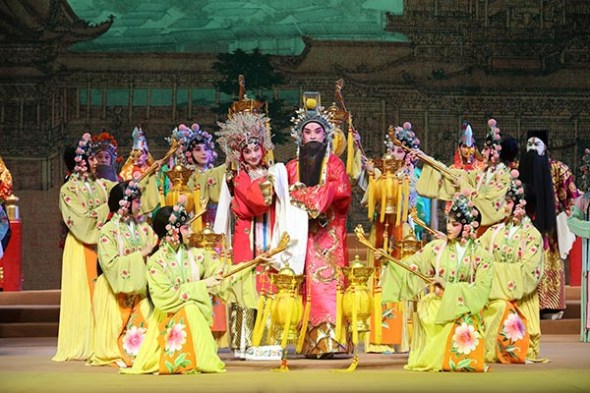
The Shanghai Kunqu Opera Troupe stages the classic Kunqu Opera piece, The Palace of Eternal Life, at the Shanghai Grand Theater in September. (Photo provided to China Daily)
More than 30 years have passed since they first met as students of Kunqu Opera. And Gu Haohao and Zhang Jun, both in their 40s, are now leading the revival of the old Chinese art form through different paths.
Kunqu Opera, one of the traditional Chinese opera forms that has a history of more than 600 years, is growing again in popularity in recent years through the efforts of performers like Gu and Zhang.
Gu, director of the State-owned Shanghai Kunqu Opera Troupe and Zhang, director of a private troupe named after him, are using innovative means to promote the opera.
As Gu sees it, she and Zhang share the same goal, but do it in different ways.
"What Zhang does is to arouse curiosity in those who have never heard about it, and what we do is to show them the traditional beauty of the form," says Gu.
Diverse repertoire
With three generations of performers trained over 60 years by the best opera schools in China, the Shanghai Kunqu Opera Troupe stands out.
The run of The Palace of Eternal Life, a classic Kunqu Opera adapted from the romance between Tang Dynasty (618-907) Emperor Xuanzong and his concubine Yang Yuhuan, at the Shanghai Grand Theater from Sept 21 to 24, saw four different groups of leading actors, respectively, performing each night.
Among them were Cai Zhengren, 77, and Zhang Jingxian, 71, who are seen as national treasures, while the youngest lead actor was Wei Li, 26.
Since 2015, the troupe has followed a system where middle-aged and younger actors learn 100 classic excerpts and six integral ones from seniors over three years.
This emphasis on training means the troupe has the capacity to stage massive productions like The Palace of Eternal Life, which requires dozens of performers.
As for Zhang, who has a total of eight performers and crew in his troupe, he follows another direction.
During a concert in a private villa in Shanghai on Sept 23, Zhang showcased Kunplug, which he says is "bringing together Kunqu Opera and contemporary music elements like electronic music, rock 'n' roll, rap and jazz".
Though some see this as controversial, Zhang's adaptations are being increasingly accepted with invitations for performances pouring in.
This has prompted him to plan a concert for more than 10,000 people next year.
Eight years ago, his aim to have "a more personalized development and do something different" prompted Zhang to leave the Shanghai Kunqu Opera Troupe, where he had been for 15 years.
He then launched a private troupe that made its debut in collaboration with the famous composer and conductor, Tan Dun.
The troupe's first work was an adapted version of the classic play, The Peony Pavilion, staged in a traditional Chinese garden in Shanghai in 2010.


















































